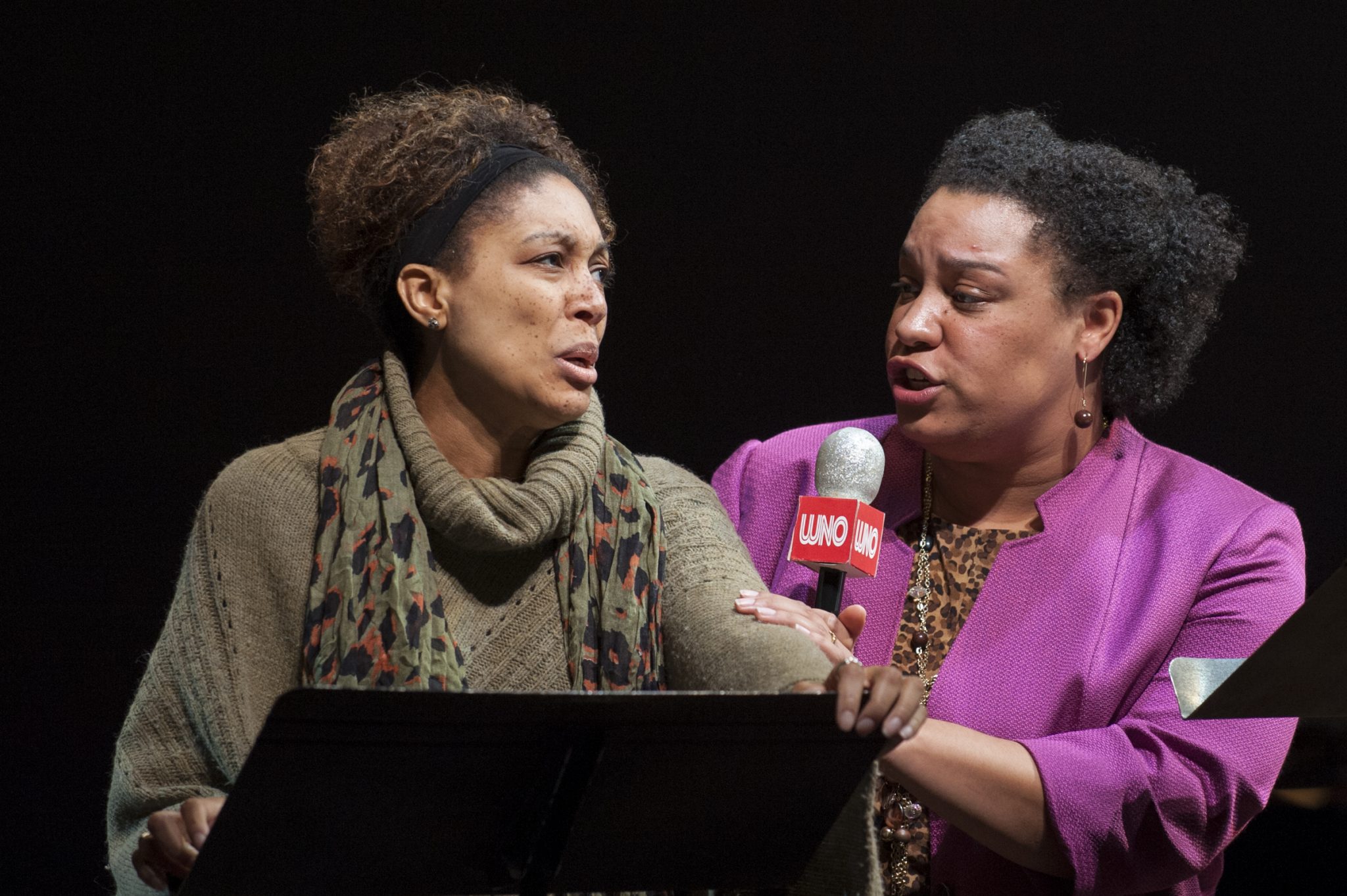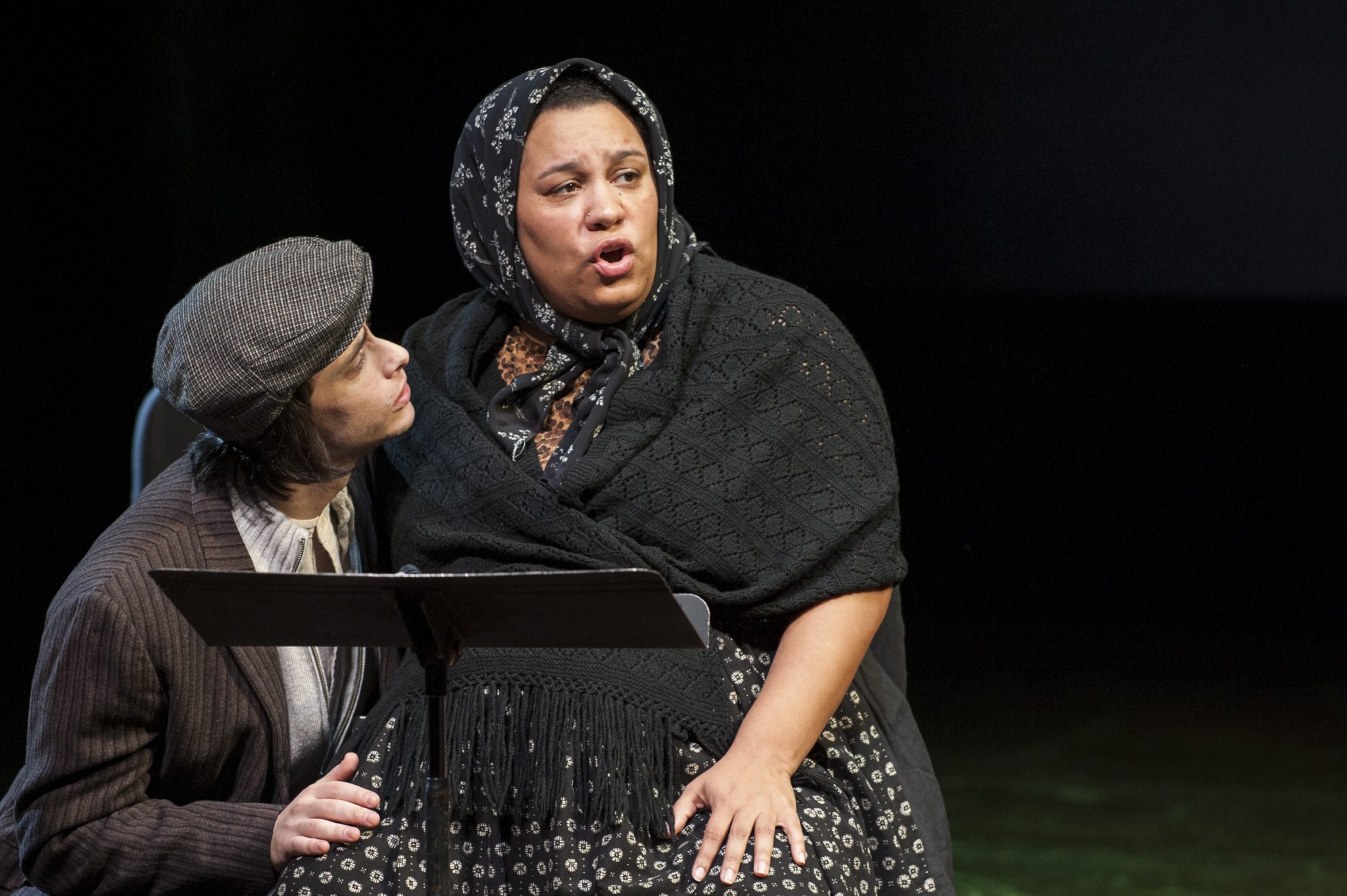“Opera really only exists in the moment that it’s being performed and opening night is like being shot out of a cannon,” remarked American composer Jake Heggie to Wednesday evening’s audience in the sold-out Terrace Theater at the Kennedy Center. He and Francesca Zambello, Washington National Opera Artistic Director, agreed on how vital a workshop experience can be for new operas. American Opera Initiative is WNO’s comprehensive new commissioning program created specifically to “stimulate, enrich and ensure the future of contemporary American opera.” The three composer/librettist teams – Jennifer Bellor and Elizabeth Reeves, Michael Gilbertson and Caroline McGraw, and Joshua Bornfield and Caitlin Vincent – created three original 20-minute works which explored the diversity of the American experience. The composers and librettists then worked with Heggie, librettist Mark Campbell, conductor Anne Manson, and singers from the WNO’s Domingo-Cafritz Young Artist Program to workshop their operas and ultimately brought them to life in concert format.

Opening the evening with Bellor and Reeves’ “Duffy’s Cut“, Norman Garrett‘s resonant baritone filled the theatre immediately as the haunted blacksmith Malachi Harris. Patrick O’Halloran (John Ruddy), Shantelle Przybylo (Catherine Burns), and Tim Augustin (John Burns) made up a pseudo-Greek chorus of the ghosts of immigrant Irish railroad workers. The title, “Duffy’s Cut”, refers to their Pennsylvania work camp from which the workers tried to flee when cholera broke out. Over the course of the work, Malachi realizes that his boss, Phillip Duffy, is responsible and that he is coercing Malachi to cover up the deaths. Soloman Howard as Duffy expertly contrasted his vocal color – displaying a hard and cold as flint bass – to that of Garrett’s warmth. To this taste, the score could employ more intervals of rest between major decisions as when Malachi chose how to mark the workers’ graves. Nevertheless, interspersing the libretto with an Irish folksong (composed by Bellor as part of the opera) offered other opportunities for crystalline, legato singing.

Zambello told the audience that the only required thematic element for the composer/librettist teams was choosing a uniquely American story. Librettist Caroline McGraw remembered that the inspiration for their American story came to her while watching the news coverage of the Boston Marathon bombing. She recalled how struck she was by the talking heads being on-screen for hours upon hours “saying nothing.” While not directly related to the Boston tragedy, McGraw and Michael Gilbertson‘s opera “Breaking” follows an overzealous features reporter who wants to spice up her ho-hum special interest pieces and dreams of catching a breaking news piece. Gilbertson’s short prelude to the work even evoked a sense of a broadcast news ident. Deborah Nansteel, as the reporter Johanna, enunciated her text clearly with a glimmering, rich mezzo sound. Wei Wu (Sam) helped raise the excitement and tension in their duet, largely in unisons, on the scene at a post office wherein hostages are held. Johanna’s character collides with Zoe, the sterling Jacqueline Echols, whose brother is held hostage inside the building. This human interaction with grief stirs Johanna’s feelings to reconsider her eagerness. After the scene changed to Johanna’s home, Patrick O’Halloran (Davey) altered the pace of the opera with softness which allowed Nansteel a touchingly solitary aria at the end of the work.

The last 20-minute opera of the evening seemed to explore more of the introduction and rising action inherent in a short story. “Uncle Alex” composed by Joshua Bornfield and libretto written by Caitlin Vincent settles on three immigrants passing through Ellis Island during 1907 and their one auspicious interaction with an immigration inspector. Tim Augustin played a gruff, authoritative inspector who calls out loudly, “Next! Next in line!” beginning his interaction with Yuri Gorodetski (Jacob Eingold), Deborah Nansteel (Anna Eingold), and the Eingold’s new-found friend Alex Margolis played by Christian Bowers. Taking time to dig into the introduction and rising action allowed Bornfield to write diverse vocal textures and colors for the singers, especially in the plaintive, satiny solo for Nansteel – “We made it. We’re here. Just a few steps away from the dream of America.” – floating over Gorodetski’s formulaic recitation of his script for the immigration inspectors “My name is Jacob Eingold.” Likewise, there is an effective duet at the end of the opera for Bowers and Augustin which draws parallels to America’s history as a nation of immigrants which Augustin perfectly underscored by motioning to the audience with his final, “Next! Next in line!“
As new music lovers everywhere understand, it is not just about the première of the piece but its longevity. As Heggie mentioned, “opera exists in the moment it’s being performed.” All three teams agreed that these operas worked best in their 20-minute forms and have no immediate plans to expand on the stories. However, it would be a joy to see these new works live on in scenes programs alongside more traditional fare. These young teams should feel proud and opera fans would be smart to keep an eye out for their work in the future.
Also part of the WNO’s American Opera Initiative is their upcoming hour-long production of “An American Soldier” composed by Huang Ruo and libretto by David Henry Hwang. This completed staged work will be presented in on June 13 and 14, 2014 directed by David Paul and Steven Jarvi will conduct the chamber orchestra. More info on “An American Soldier” can be found on the Kennedy Center’s website.
Related articles
- in performance: Two Standout Debuts in Washington National’s “Forza” (sybariticsinger.com)
